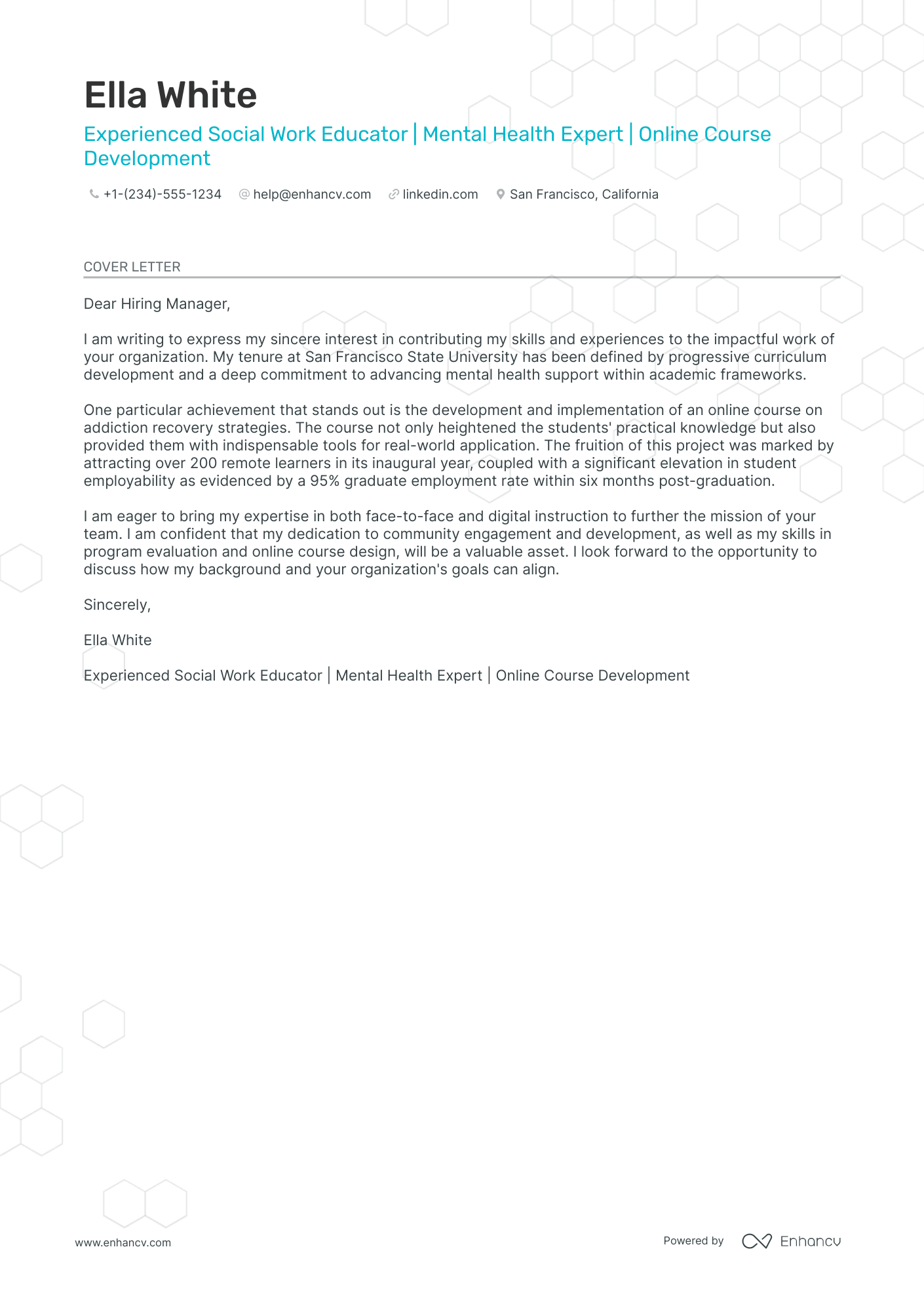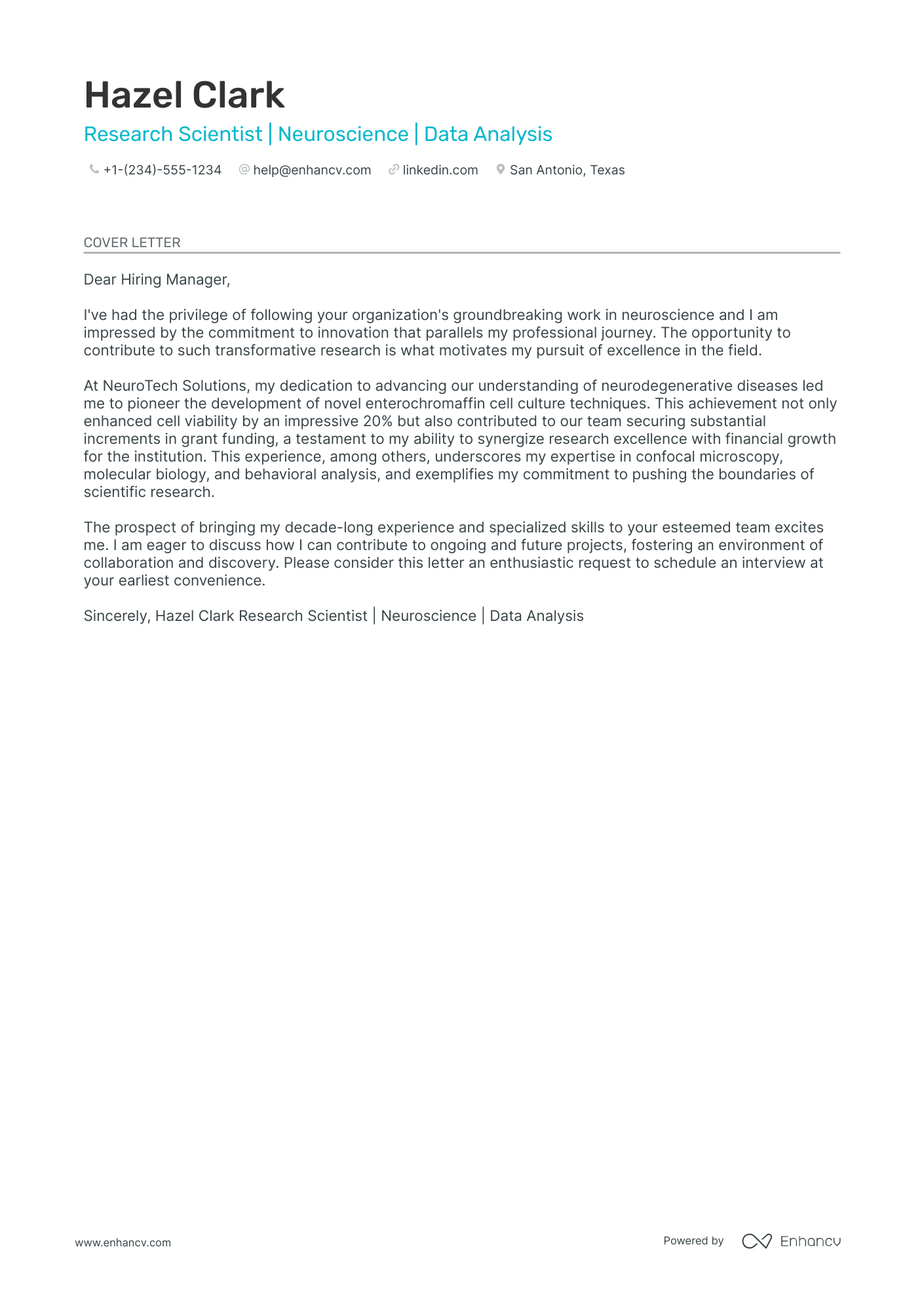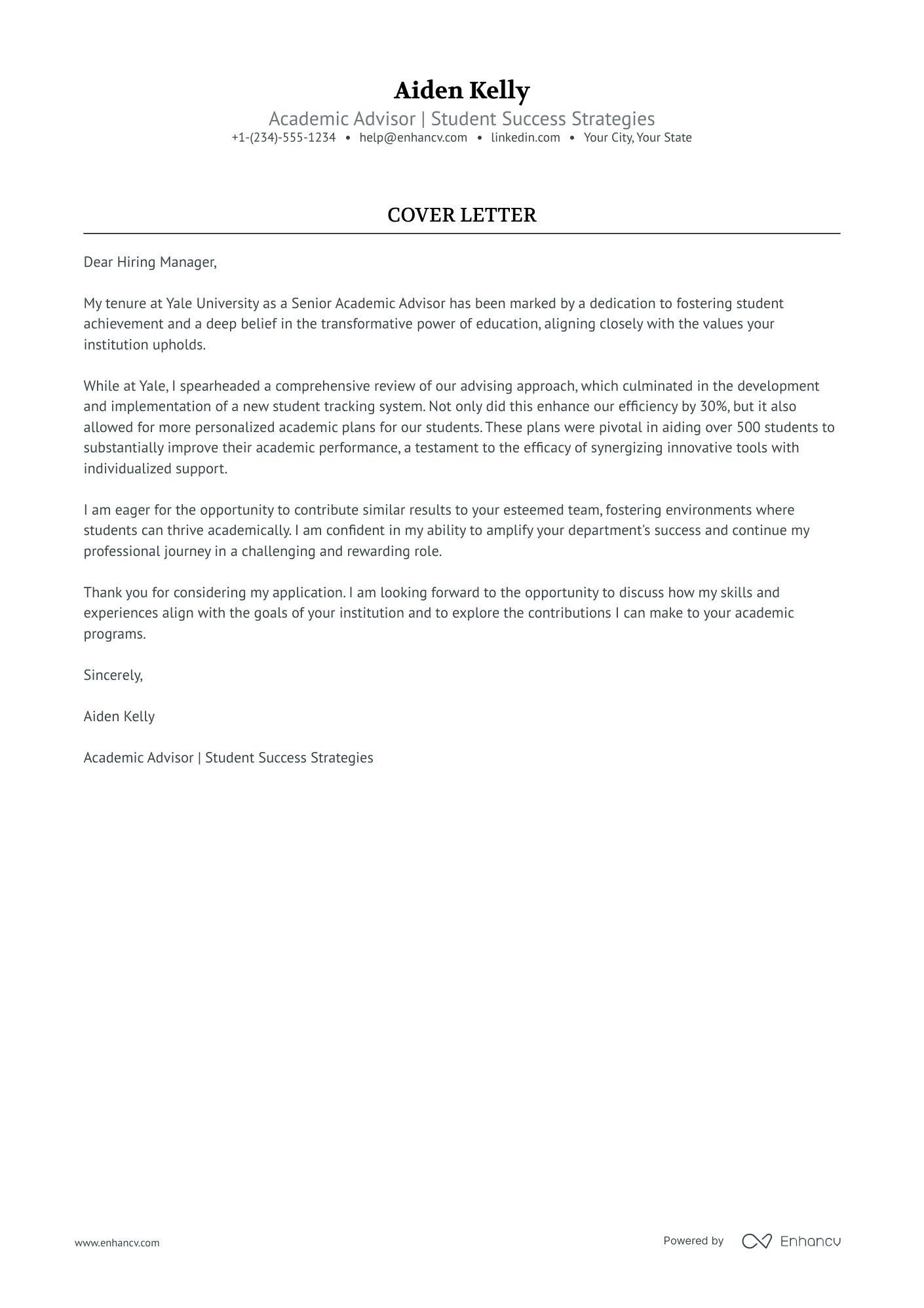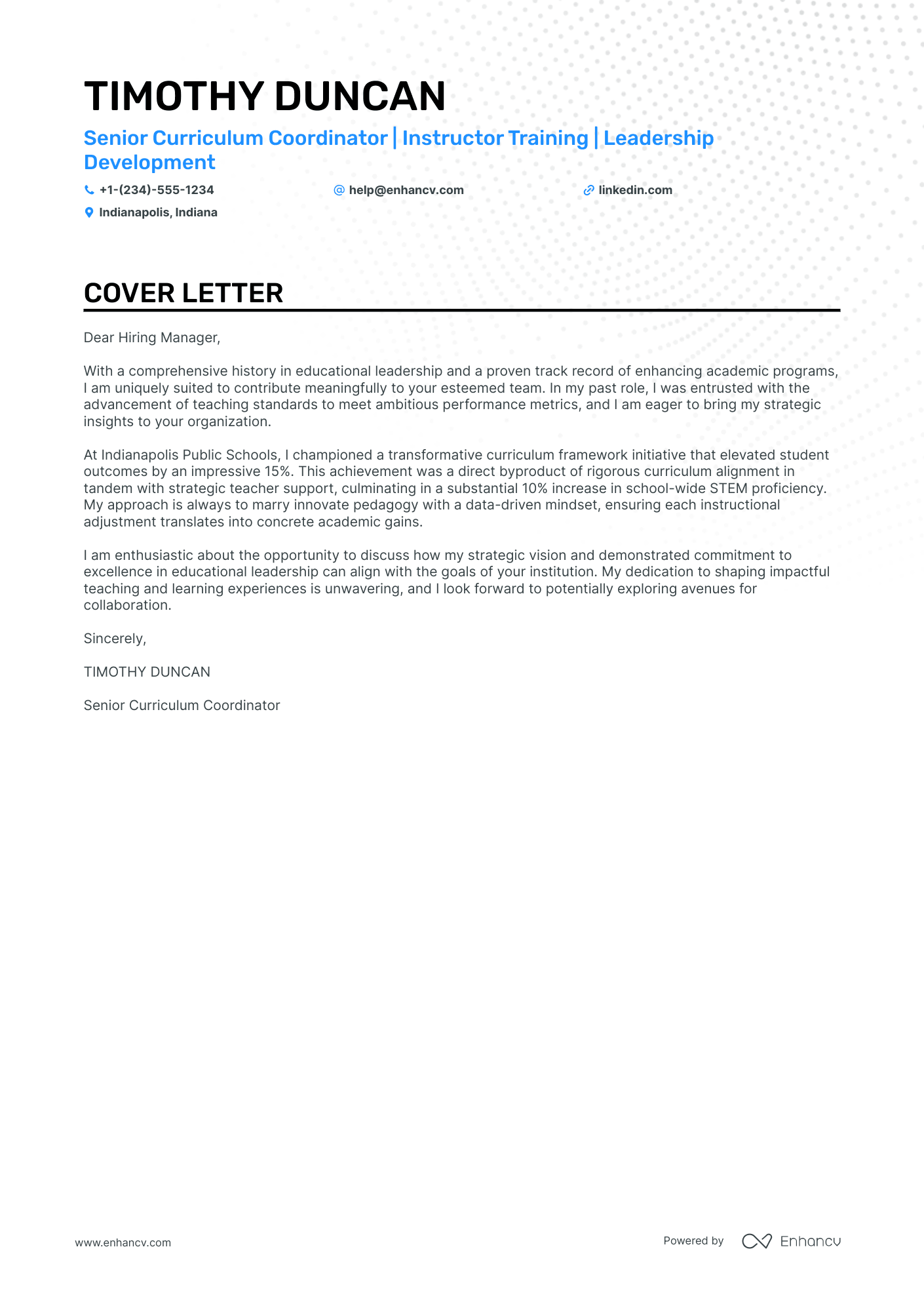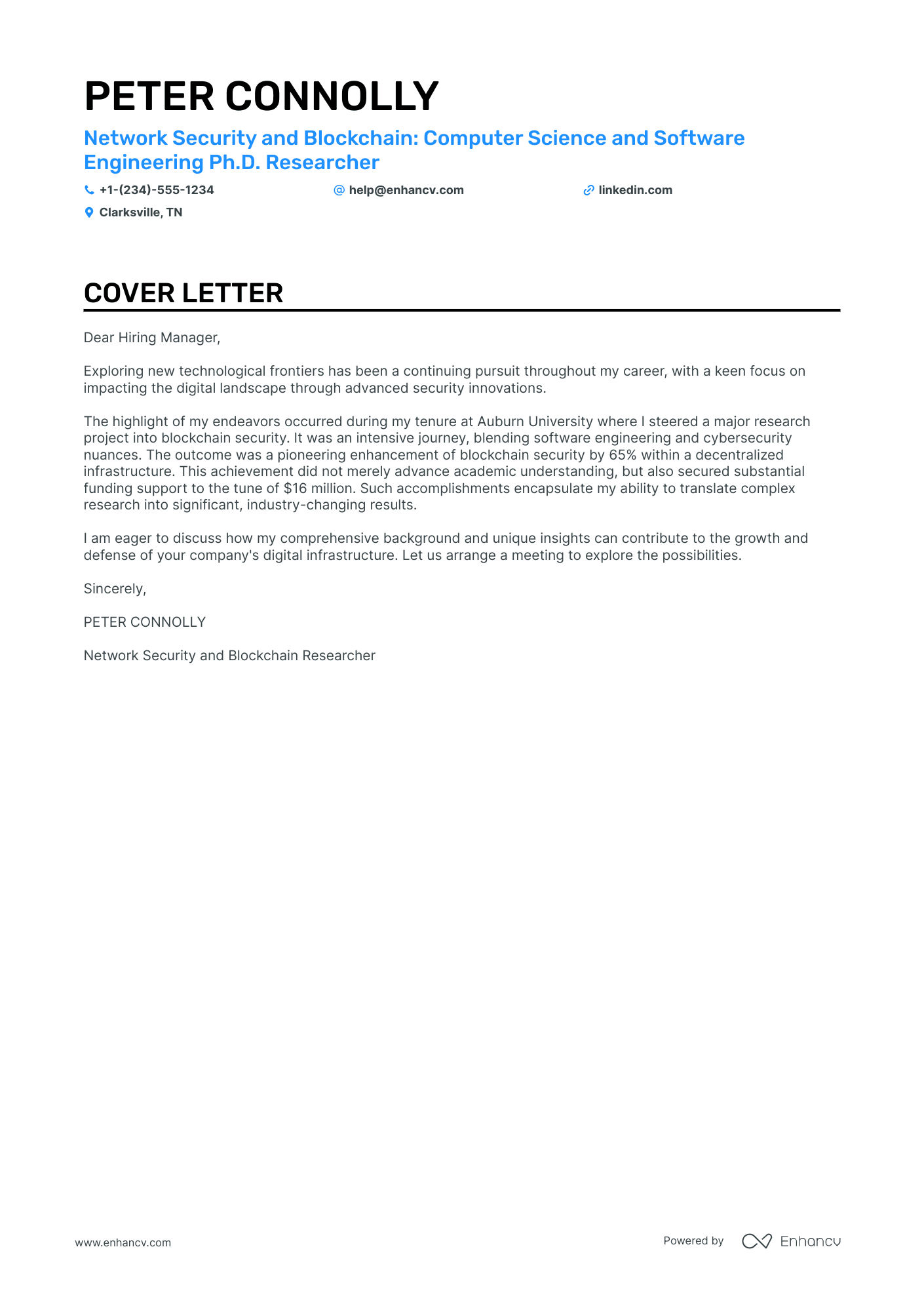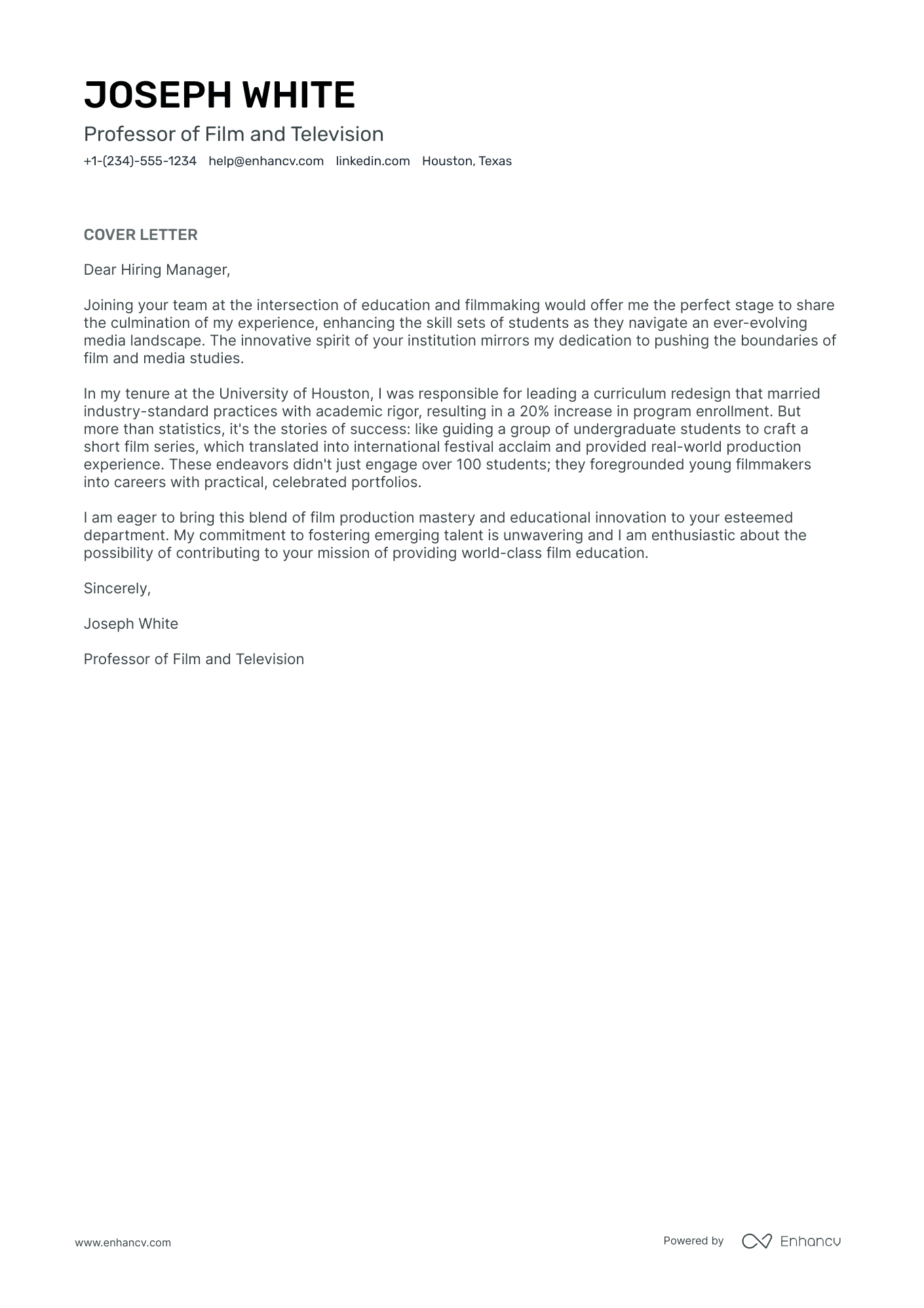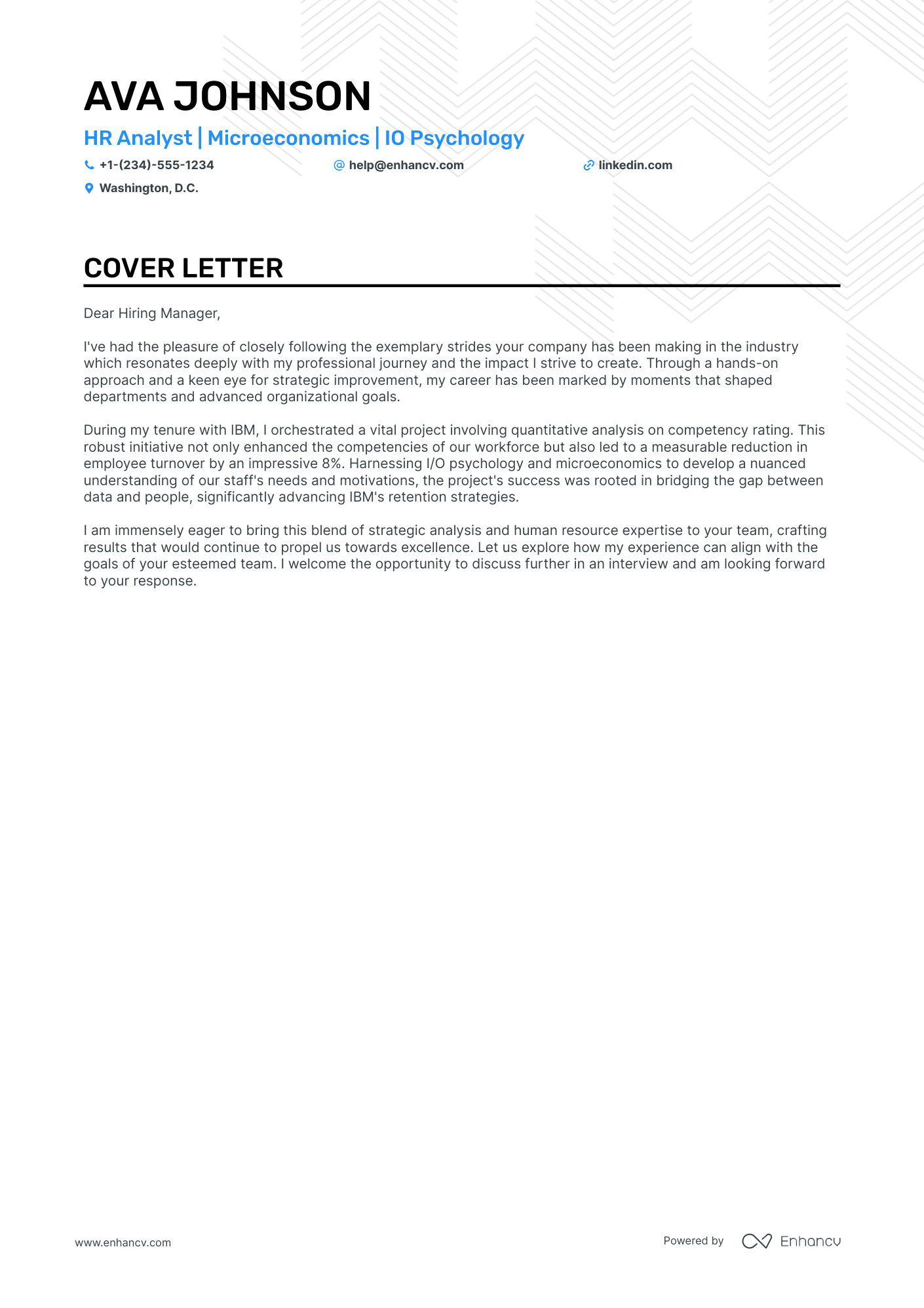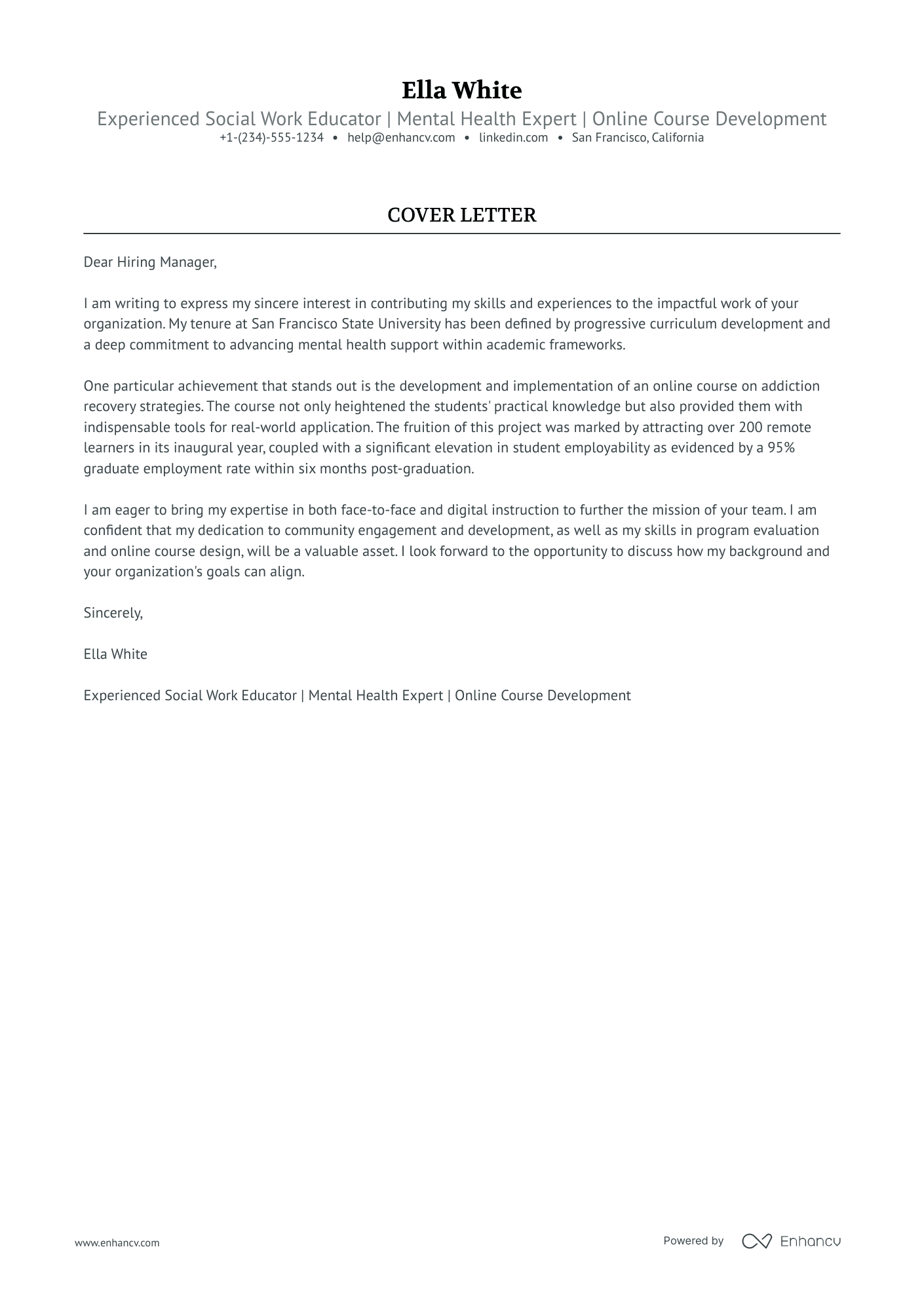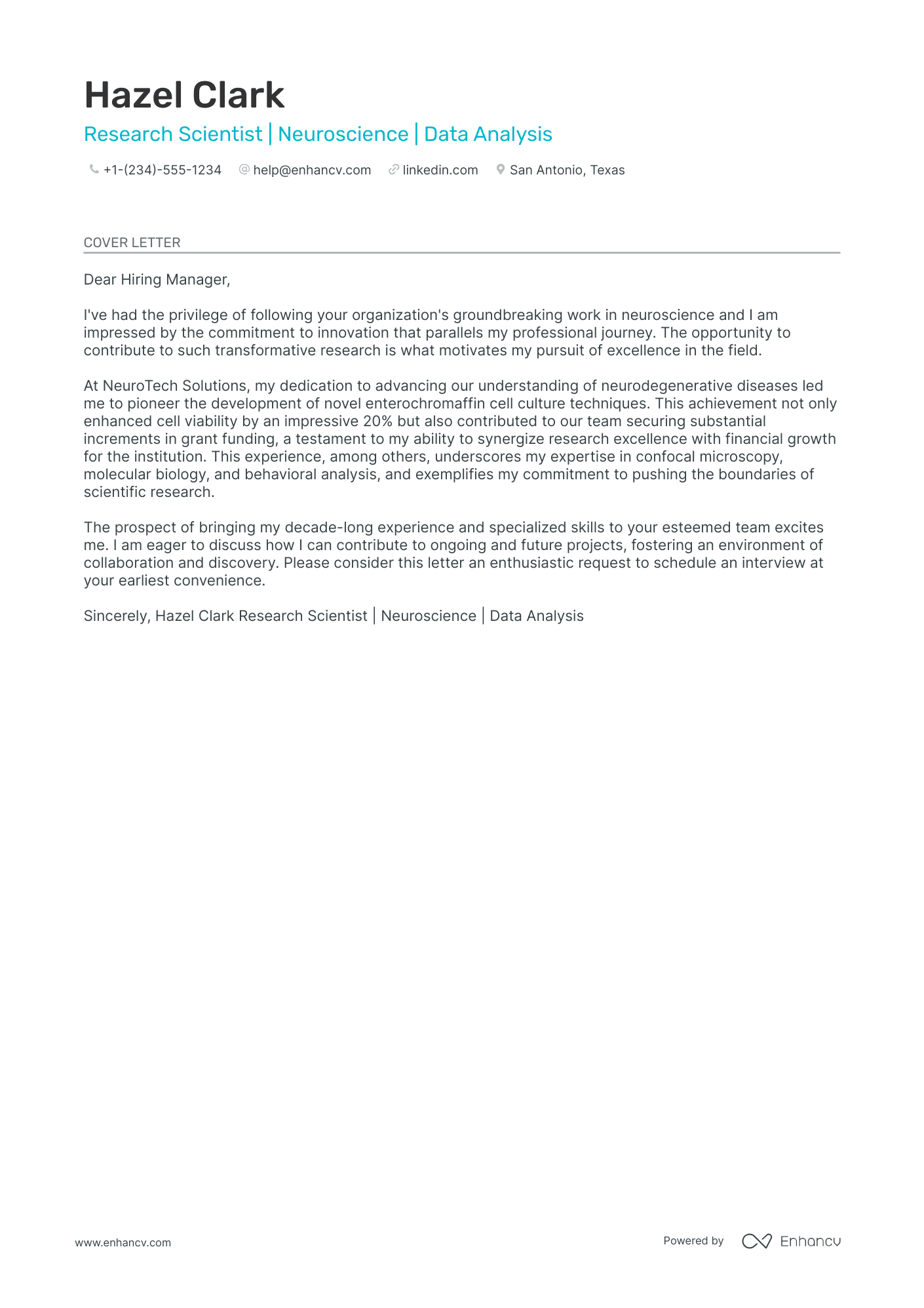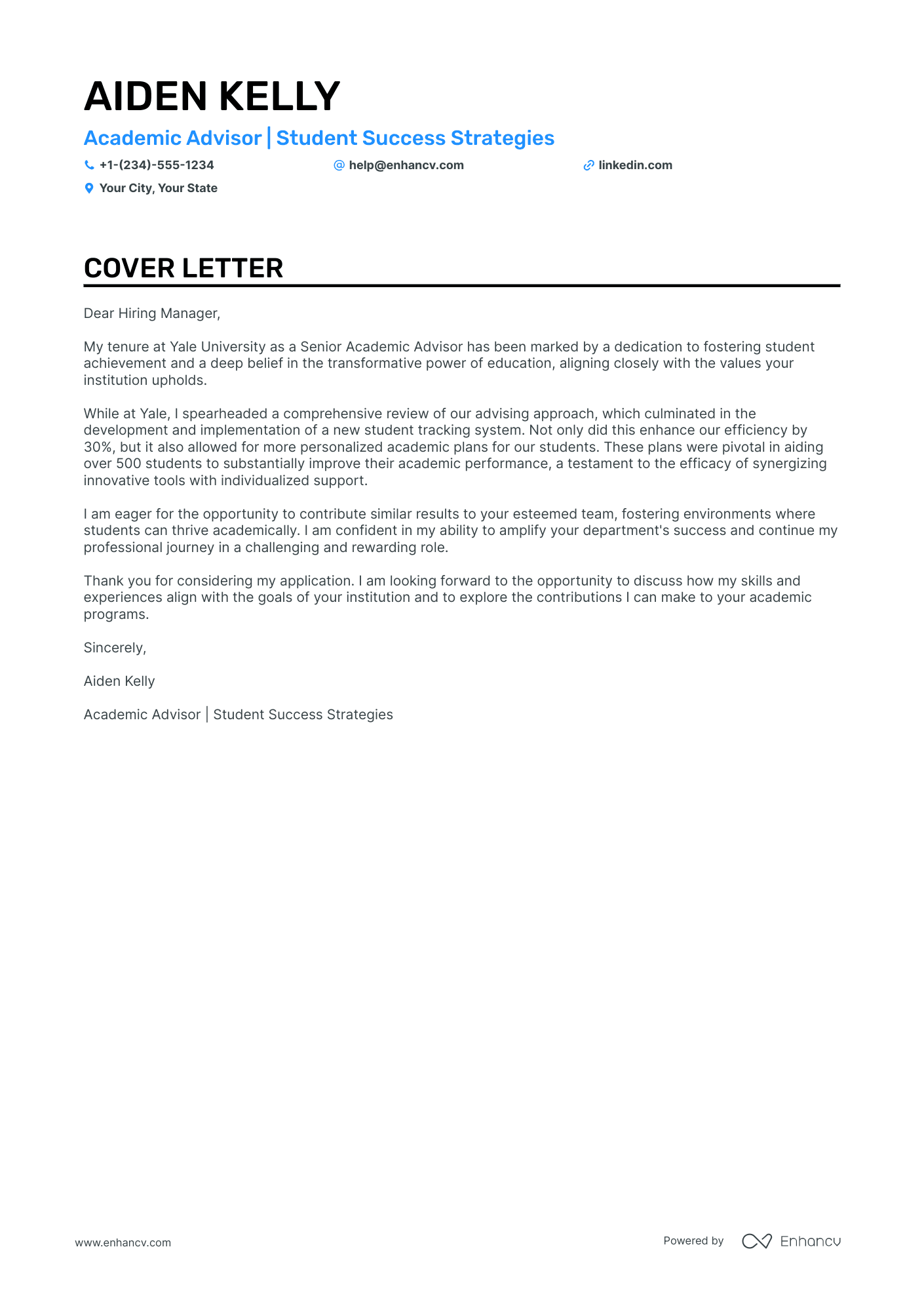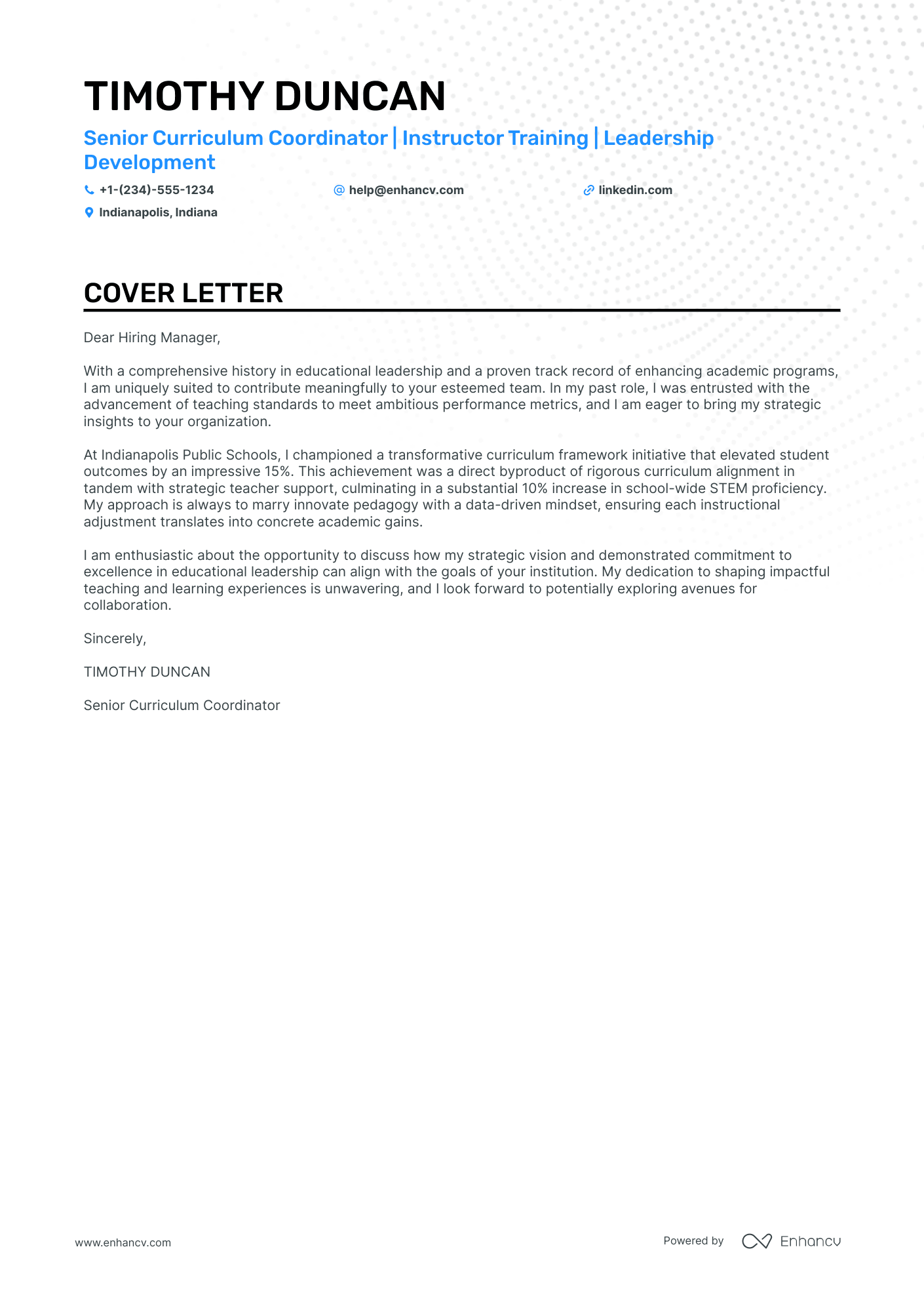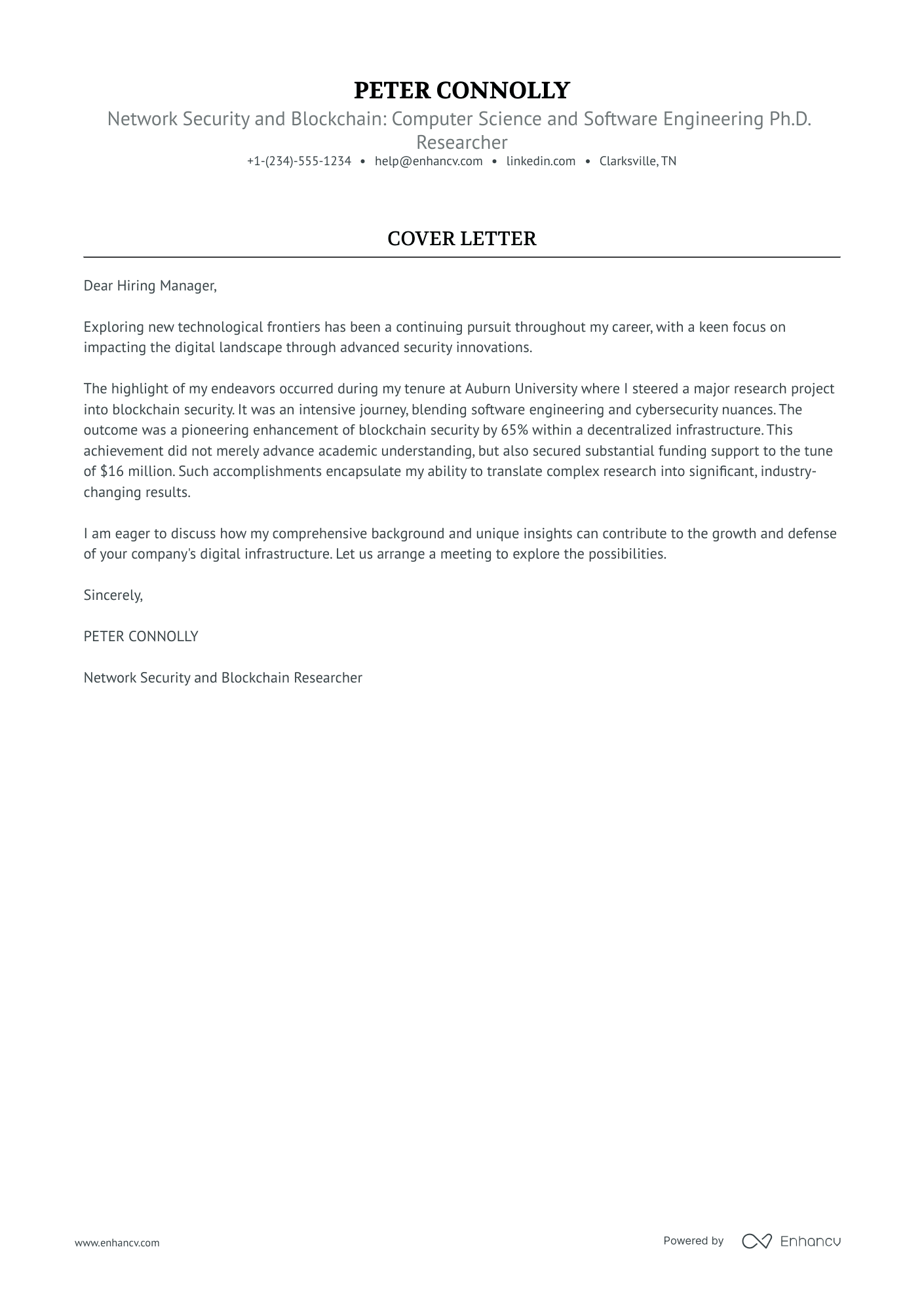Crafting an academic cover letter can be a stumbling block, especially when you're already deep into job applications and realize it's a required piece of the puzzle. This isn't just a repeat of your resume; it's your chance to spotlight a shining professional triumph and weave a compelling narrative around it. Forget the clichés—your cover letter must exude formality without being mundane, all while fitting neatly on a single page. Let's unlock the secrets to a cover letter that leaves a lasting impression.
- Making excellent use of job-winning real-life professional cover letters;
- Writing the first paragraphs of your academic cover letter to get attention and connect with the recruiters - immediately;
- Single out your most noteworthy achievement (even if it's outside your career);
- Get a better understanding of what you must include in your academic cover letter to land the job.
Let the power of Enhancv's AI work for you: create your academic cover letter by uploading your resume.
If the academic isn't exactly the one you're looking for we have a plethora of cover letter examples for jobs like this one:
- Academic resume guide and example
- Theatre Teacher cover letter example
- Teacher Assistant cover letter example
- Professor cover letter example
- Language Teacher cover letter example
- Transitioning Teacher cover letter example
- Lecturer cover letter example
- Kindergarten Teacher cover letter example
- Online Teacher cover letter example
- Retired Teacher cover letter example
- After School Teacher cover letter example
Academic cover letter example
Carter Andrade
London
+1-(234)-555-1234
help@enhancv.com
- Highlighting Relevant Achievements: The cover letter effectively showcases past accomplishments, such as reducing billing processing time by 30% and billing errors by 20%, which directly relate to the Billing Manager role and demonstrate the candidate's relevant experience and success in process optimization.
- Focus on Process Improvement: By emphasizing a hands-on approach to revamping outdated procedures, the writer displays a commitment to enhancing financial workflows, an essential skill for a Billing Manager tasked with maintaining efficient billing operations.
- Leadership Skills: The candidate mentions leading a team during a cross-departmental initiative, pointing to strong leadership and team management abilities, which are crucial for a managerial position responsible for overseeing the billing department.
Five tips on formatting your academic cover letter
Do you want to make a good impression on recruiters and, at the same time, follow the best industry advice on writing your academic cover letter?
Make sure to include the following:
- Header and Salutation;
- Introductory paragraph;
- Body paragraph;
- Closing paragraph;
- Signature (this one is up to you).
Remember to use the same modern, simple font for your academic cover letter as you did for your resume (e.g. Lato, Rubik, etc.)
Ensure your academic cover letter is single-spaced and is wrapped around a one-inch margin, like in our cover letter templates.
Once completed, use our cover letter builder to export your academic cover letter in the best format to keep your information intact - PDF.
At the end of the day, your academic cover letter won't be assessed by the Applicant Tracker System (ATS) software, but by the recruiters. Your information should thus be legible, organized, and follow a structured logic.
The top sections on a academic cover letter
- Header: This section includes your contact information, the date, and the recipient's details, ensuring that your cover letter appears professional and reaches the correct person.
- Opening Greeting: A formal salutation addresses the hiring committee or specific individual by name, demonstrating that you have researched the institution and are personalizing your application.
- Introduction: Briefly introduces who you are, your current academic status, and the position you are applying for, setting the stage for why you are a strong fit for the role.
- Academic Achievements and Experience: Highlights your relevant educational background, research accomplishments, teaching experience, and any publications, tailored to the academic position to showcase your qualifications and alignment with the job.
- Closing Paragraph: This is where you reiterate your interest in the position, mention your availability for an interview, and thank the recipient for considering your application, leaving a professional and respectful impression.
Key qualities recruiters search for in a candidate’s cover letter
- Research expertise in the specified field: Demonstrates the ability to contribute to the academic community through original research.
- Teaching experience and pedagogical skills: Showcases the capability to educate and mentor students effectively.
- Publications and scholarly work: Indicates a track record of contributing to the body of knowledge in the field.
- Grants and funded research experience: Reflects success in obtaining financial support for research, which is crucial for many academic institutions.
- Collaboration and interdisciplinary work: Highlights the ability to work across disciplines, which is increasingly valued in academia for its potential to foster innovative research.
- Service to the academic community: Demonstrates a commitment to contributing to the functioning and governance of the institution through committee work, peer review, or other service roles.
How to personalize your academic cover letter greeting
Before you start writing your academic cover letter, take the time to find out who is recruiting for the role.
Search for the recruiter's name on LinkedIn or the corporate website to address them personally in your academic cover letter salutation.
What if you can't find out who's recruiting for the role?
Always aim to avoid the very impersonal "Dear Sir/Madam" - instead, opt out for "Dear HR Team" or "Dear Hiring Manager" to make a better first impression.
List of salutations you can use
- Dear Hiring Committee,
- Dear [Department] Selection Committee,
- Dear Professor [Last Name],
- Dear Dr. [Last Name],
- Dear Search Committee Chair,
- Dear [University/College] Faculty,
What to include in those first two sentences, or your academic cover letter introduction
Have you ever wondered what the best way is to present your profile in the academic cover letter introduction?
There's no right or wrong answer if you're being concise and authentic to yourself.
Some professionals start their academic cover letter by:
- congratulating the company - focusing on something impressive, whether that's an award, an industry-leading project, or a key event;
- aligning their passion for the field or industry with the job - if you're enthusiastic about what you do, you'd thus grow your skill set and value as a professional.
That one achievement in your academic cover letter body
The lengthiest part of your academic cover letter is the body.
Within the next three to six middle paragraphs, present yourself as the best candidate for the role.
How can you do that without retelling your whole professional resume?
Select one key achievement that covers job-crucial skills and technologies (and is memorable).
Within the body of your academic cover letter, aim to tell the story of how you achieved your success. Also, write about how this would help out your potential team.
Finishing off your academic cover letter with what matters most
So far, you've done a fantastic job in tailoring your academic cover letter for the role and recruiter.
Your final opportunity to make a good impression is your closing paragraph.
And, no, a "Sincerely yours" just won't do, as it sounds too vague and impersonal.
End your academic cover letter with the future in mind.
So, if you get this opportunity, what do you plan to achieve? Be as specific, as possible, of what value you'd bring to the organization.
You could also thank recruiters for their interest in your profile and prompt for follow-up actions (and organizing your first interview).
The zero experience academic cover letter: shifting the focus to your unique value
Don't worry if you have no conventional professional experience. Within your whole experience, there's plenty more you can write about in your academic cover letter.
Take, for example, your biggest achievement or award - dedicate your cover letter body to describe it and the job-relevant skills you've learned.
Your professional ambitions could also take center stage. Describe what you plan on achieving in the next five to ten years and the efforts you're making towards your dreams.
Key takeaways
Within this Enhancv guide, we've provided you with plenty of advice and inspiration on writing your academic cover letter:
- Always make sure your academic cover letter is tailored to the role you're applying for to make a good impression on recruiters;
- In your academic cover letter include a header (with your name, the role you're applying for, date, and contact details) and an introduction of up to two sentences that highlight your key accomplishment or why you'd fit the role;
- Focus your academic cover letter body on one sole achievement through your career and all the valuable lessons, skills, and know-how you've learned (that are relevant to the role);
- Ensure your academic cover letter closing statement isn't generic and includes either a call to action or a promise;
- If you lack professional experience, shift recruiters' focus to a relevant achievement (thanks to your academic or versatile experience) or toward your dreams and goals for professional growth.
Academic cover letter examples
Explore additional academic cover letter samples and guides and see what works for your level of experience or role.
By Role
